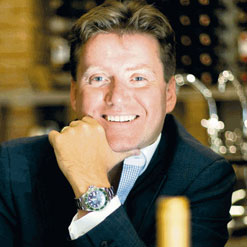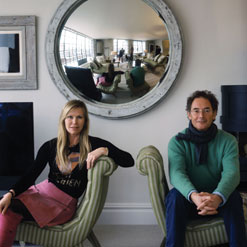Caterer and Hotelkeeper Top 100 – Who's Who in Hotels
Last month Caterer and Hotelkeeper, in association with Caterer.com, revealed its list of the 100 most influential people in hospitality. This week we analyse the biggest movers and shakers in the hotels sector. Emily Manson reports
While few in hospitality would welcome the prolonged periods of economic hardship we are currently enduring, it certainly separates the wheat from the chaff. Companies with coherent strategies, global reach and innovative ideas are most likely to succeed, while those with financial cracks, ineffective management or weak leadership are likely to be exposed, stumble and fall.
The hotel entries in the Caterer and Hotelkeeper 100 list for 2012 reflect this economic turbulence, as well as the diverse nature of the sector and the way it is accommodating the changing consumer habits formed out of the prolonged downturn.
Winners and Losers Veteran independent operator Robin Hutson says: "The sluggish economy continues to occupy our minds, although, as is always the case in difficult times, it hits the mediocre operators hardest.
"I think this is a period where value and integrity of product and service really count. There is so much choice available, if you don't deliver the goods and aren't ahead of your competition then there is a good chance of failure. The positive effect of this is, of course, raised standards across the board."
Hotel consultant Melvin Gold notes that while some hoteliers have disappeared from the latest Caterer and Hotelkeeper 100, those that remain tend to reflect the changing face of the market.
Similarly De Vere and Village Urban Resort Hotels' chief executive Robert Cook believes that the list shows some of the real big world brands making a resurgence.
"It's a result of what's happened in the past five years where no new brands have come to market. The big brand models of franchising and management contracts is where the market is today," he adds.
Pole Position InterContinental Hotels Group regained the top hotelier slot with CEO Richard Solomons having spent a year consolidating his new position after taking over the top job from the charismatic Andrew Cosslett in 2011. Last year also saw the addition of two new brands and an increase in the company's presence in China, reaffirming its position as the biggest international hotel player within the growing Eastern superpower.
"IHG is arguably the biggest and best hotel group in the world and it's good to see Richard Solomons at the top of this list," says Cook. "But it's also great to see people like Robin Hutson and Rocco Forte as the men of boutique and luxury in there too, who are batting through their reputations and great innovations and ideas."
Brand Power Cook's point highlights the sector's split, which has seen two very distinct camps of hotelier evolving. It's well known that customers fall back to trusted names and brands during recessions, so it's perhaps unsurprising to see the continued development and expansion of brands from the international players like Hilton with Staybridge Suites and Doubletree and IHG with EVEN and Hualuxe.
New entry Michael Wale, who oversaw the 2012 launch of Starwood Hotels & Resorts' Aloft and W brands into the UK market, says brands need to constantly evolve to stay ahead.
"The economic situation in our historic source markets has been a challenge this year," he adds. "As a result, we have had to quickly adapt our marketing strategies to capture guests from emerging markets such as China, Brazil and the Middle East."
Turmoil Of course the turmoil of the sector is also reflected in the list, with Robert Cook having risen in the rankings following his move to the larger De Vere Group from his eight year tenure at Malmaison and Hotel du Vin, while Grant Hearn fell from his No.2 ranking (overall) in 2011 to No.56 (overall) in the 2012 list, reflecting the severity of Travelodge's financial problems.
"Many hoteliers will be pleased to see 2012 left behind. It was a difficult year for many, especially in the regions. In addition there are the difficulties caused by financing arrangements, which affected many companies," Gold adds.
New Entries New entries this year saw luxury boutique hotel operator and environmental champions Jonathan Raggett, managing director of Red Carnation hotels, and Mark Sainsbury, of the Zetter, listed for the first time as well as the return of Danny Peccorelli of Exclusive Hotels.
Mark Linehan, managing director of the Sustainable Restaurant Association, says: "The fact that high quality hotels like the 
Zetter, Exclusive and Red Carnation are appearing on the list demonstrates that luxury and sustainability are not mutually exclusive qualities. By combining these two key elements, hoteliers are providing their customers with exactly what they want - a great experience they can feel good about."
Looking Ahead Raggett speaks for many hoteliers when he says: "London 2012 was fantastic. The world was watching and the country and city put on an amazing show, our hotels were buzzing and a great spirit and sense of pride and camaraderie descended."
But he warns that without worldwide events to attact tourists 2013 is unlikely to be quite so successful. "This year London especially will find it a challenge to fill the extra capacity in hotel rooms," he says. "The likes of Visitâ€'
Britain and Visit London are working hard to maintain the legacy of last year, and from our side, the emphasis will be to continue to provide an outstanding service and experience 
to each and every guest to maintain our high levels of customer loyalty."
| !Richard Soloman](https://cdn.filestackcontent.com/NfI6qo1SqSUGkyJBUEwz) |
| 











